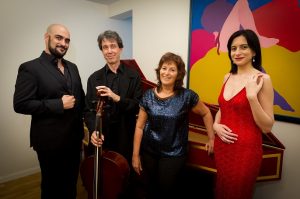Sunday, October 2
Varaždin Old Castle, 11 a.m.
Concert accompanied by baroque coffee Ensemble REGINA IBERICA
Cristobal Morales (1500.-1553.)
Si no vos hubiera mirando
(If wouldn’t I have ever look at you)
Sebastián Durón (1660.-1716.)
El poder en sus armas
(Their power in your weapons)
iz The new weapons of love
Their power in your weapons must die, Jupiter
Since I am the one affronted today, Cupido, arietta
Sebastián Durón Ay de mí, que el llanto y la tristeza
(Ah, poor me, cry and sadness)
Cnatada a solo al Santíssimo y de Pasión
Recitativo Aria Recitativo Juan de Araňés (? -oko 1650.)
Dígame un requiebro
(Tell me a compliment)
Aria Couplets Torrejón y Velasco (1664.-1728.)
Cuando el bien que adoro
(When the beloved is absent)
Aria Couplets J. Sergueira de Lima (oko 1655.-oko 1726.)
Mares, montes, vientos, luna y sol
Aria Couplets 3 komična djela: Anonimus (17. stoljeće)
Es el amor, ay , ay
(It is love, ay, ay)
Juan Hidalgo (1614.-1685.)
Ay, que sí, ay, que no
(Ah, yes! Ah, no!)
Juan del Vado (oko 1625.-1691.)
Con amor se paga el amor
(With love you pay love)
Giuseppe Jacchini (1670.-1727.)
Sonata para violonchelo y B.C.
Grave (italic)
Andante mosso (italic)
Adagio (italic)
Aria (italic)
Anonimus (17. stoljeće)
Ay, amargas soledades
(Ah, bitter solitudes)
Lope de Vega, tekst
Antonio Literes (1673.-1747.)
Déjame llorar, ingrata
(Let me, ungratef, cry)
Let me, ungrateful, cry, Aria
Matilde, if my love was my crime, Recitativo
Do not deny, no, to my faith, Arieta
But, ah! Your deflection in false irony, Recitativo
Treat her well, dear severity, Arieta airosa
José de Nebra (1700.-1752.)
Ay, Dios aleve
(Ah, treacherous God)
Es el hijo del viento
(He is the son of the Wind)
iz Wind is the joy of Love
Love and Ninpha sing:
Aria Couplets Aria
A long trajectory in Spanish Baroque music with singing and a focus on the most recent historical criteria is what characterizes Regina Ibérica, created in 1998 by Laura Casanova.
In 2015, the recording of their third album stands out: The 12 Musicians of Iriarte (Lindoro). It groups works from Spanish composers in a scope of three centuries. Following the steps of the poem The Music by Tomás de Iriarte, this record offers retrievals of unpublished works and the first recordings of published ones, as well as versions of known works in the world of Early music.
Regina Ibérica has performed at the Early Music Festival in St. Petersburg and in the
Conservatory of Moscow. It has also performed in several Spanish cities, and in
Bremen, Budapest, Munich, Bergen (Norway), Warsaw, Gdansk, Paris, Rome, and Brussels. Currently, Regina Ibérica is managing projects in Japan, and Colombia as well as in Spain.
Their first two records are: It is love, ay, ay, with human tones of Spanish Baroque, and Handel before “The Messiah”, the cantatas that Handel later transformed into choirs of “The Messiah”; both records released by the record company Verso.

Varaždin Old Castle, 11 a.m.
Concert accompanied by baroque coffee Ensemble REGINA IBERICA
Programme:
Es el amor, ay, ay It is love

Cristobal Morales (1500.-1553.)
Si no vos hubiera mirando
(If wouldn’t I have ever look at you)
Sebastián Durón (1660.-1716.)

El poder en sus armas
(Their power in your weapons)
iz The new weapons of love
Their power in your weapons must die, Jupiter
Since I am the one affronted today, Cupido, arietta
Sebastián Durón Ay de mí, que el llanto y la tristeza
(Ah, poor me, cry and sadness)
Cnatada a solo al Santíssimo y de Pasión
Recitativo Aria Recitativo Juan de Araňés (? -oko 1650.)
Dígame un requiebro
(Tell me a compliment)
Aria Couplets Torrejón y Velasco (1664.-1728.)
Cuando el bien que adoro
(When the beloved is absent)
Aria Couplets J. Sergueira de Lima (oko 1655.-oko 1726.)
Mares, montes, vientos, luna y sol
Aria Couplets 3 komična djela: Anonimus (17. stoljeće)
Es el amor, ay , ay
(It is love, ay, ay)
Juan Hidalgo (1614.-1685.)
Ay, que sí, ay, que no
(Ah, yes! Ah, no!)
Juan del Vado (oko 1625.-1691.)
Con amor se paga el amor
(With love you pay love)
Giuseppe Jacchini (1670.-1727.)
Sonata para violonchelo y B.C.
Grave (italic)
Andante mosso (italic)
Adagio (italic)
Aria (italic)
Anonimus (17. stoljeće)
Ay, amargas soledades
(Ah, bitter solitudes)
Lope de Vega, tekst
Antonio Literes (1673.-1747.)
Déjame llorar, ingrata
(Let me, ungratef, cry)
Let me, ungrateful, cry, Aria
Matilde, if my love was my crime, Recitativo
Do not deny, no, to my faith, Arieta
But, ah! Your deflection in false irony, Recitativo
Treat her well, dear severity, Arieta airosa
José de Nebra (1700.-1752.)
Ay, Dios aleve
(Ah, treacherous God)
Es el hijo del viento
(He is the son of the Wind)
iz Wind is the joy of Love
Love and Ninpha sing:
Aria Couplets Aria
About:
REGINA IBÉRICAA long trajectory in Spanish Baroque music with singing and a focus on the most recent historical criteria is what characterizes Regina Ibérica, created in 1998 by Laura Casanova.
In 2015, the recording of their third album stands out: The 12 Musicians of Iriarte (Lindoro). It groups works from Spanish composers in a scope of three centuries. Following the steps of the poem The Music by Tomás de Iriarte, this record offers retrievals of unpublished works and the first recordings of published ones, as well as versions of known works in the world of Early music.
Regina Ibérica has performed at the Early Music Festival in St. Petersburg and in the
Conservatory of Moscow. It has also performed in several Spanish cities, and in
Bremen, Budapest, Munich, Bergen (Norway), Warsaw, Gdansk, Paris, Rome, and Brussels. Currently, Regina Ibérica is managing projects in Japan, and Colombia as well as in Spain.
Their first two records are: It is love, ay, ay, with human tones of Spanish Baroque, and Handel before “The Messiah”, the cantatas that Handel later transformed into choirs of “The Messiah”; both records released by the record company Verso.
